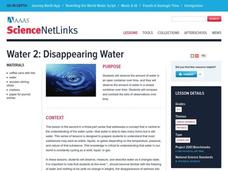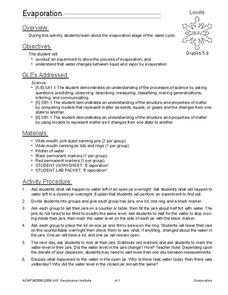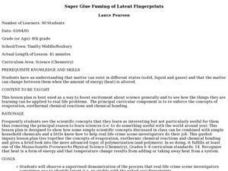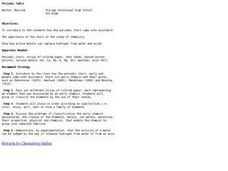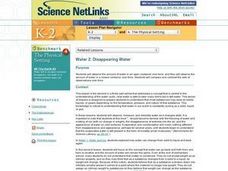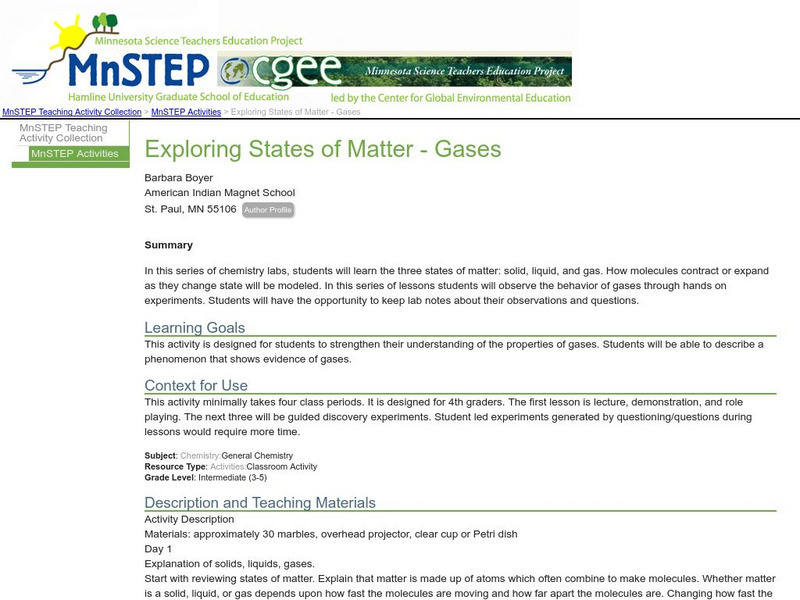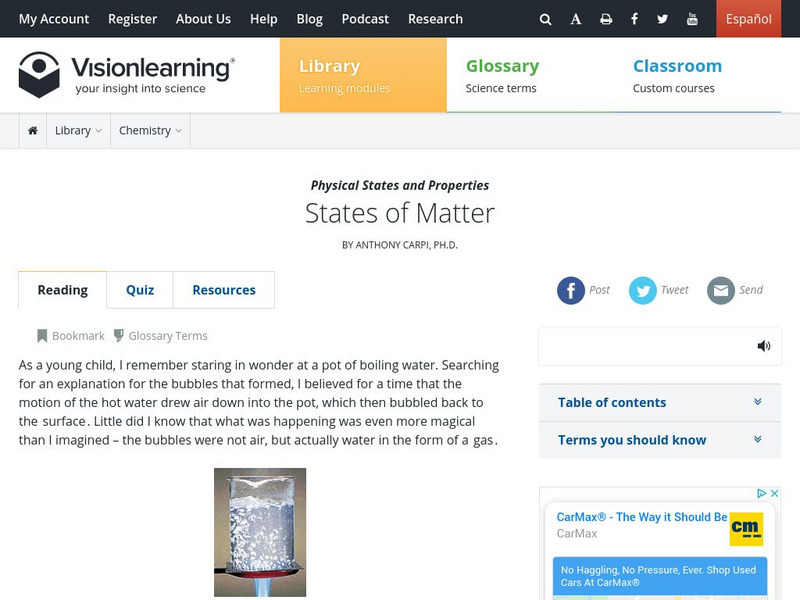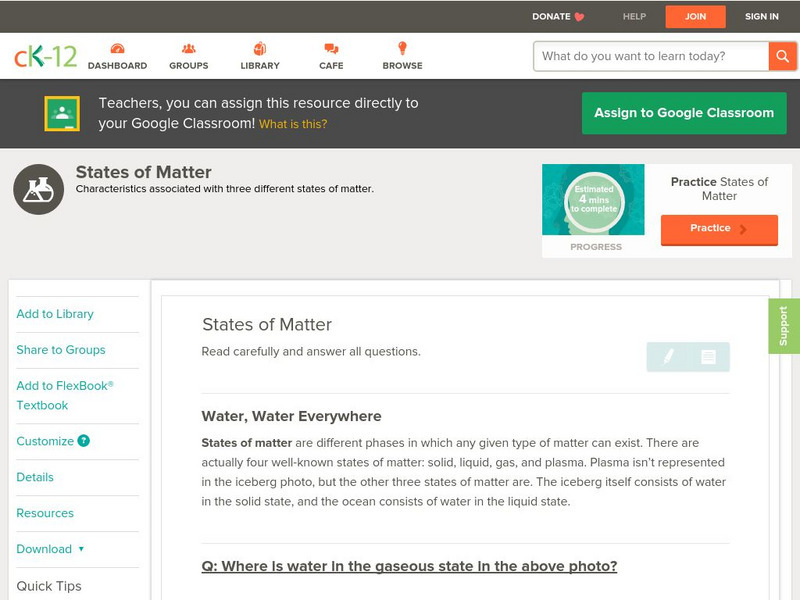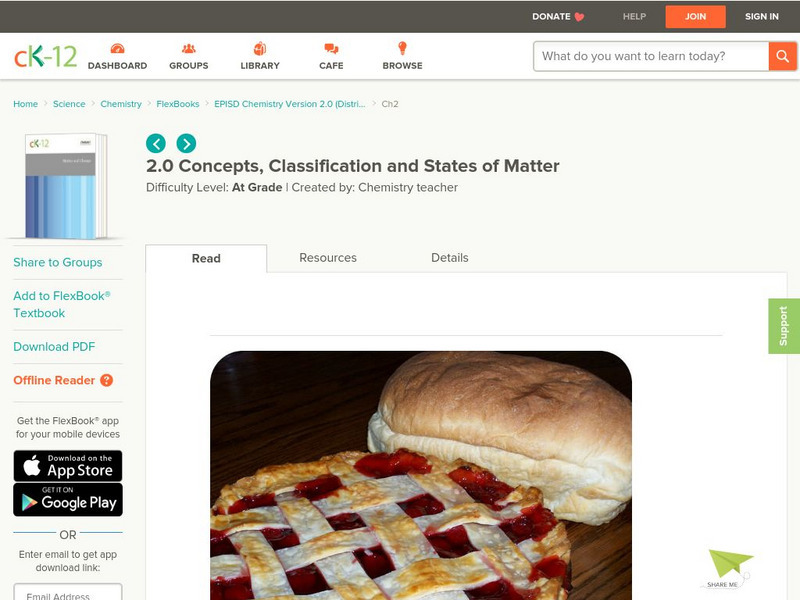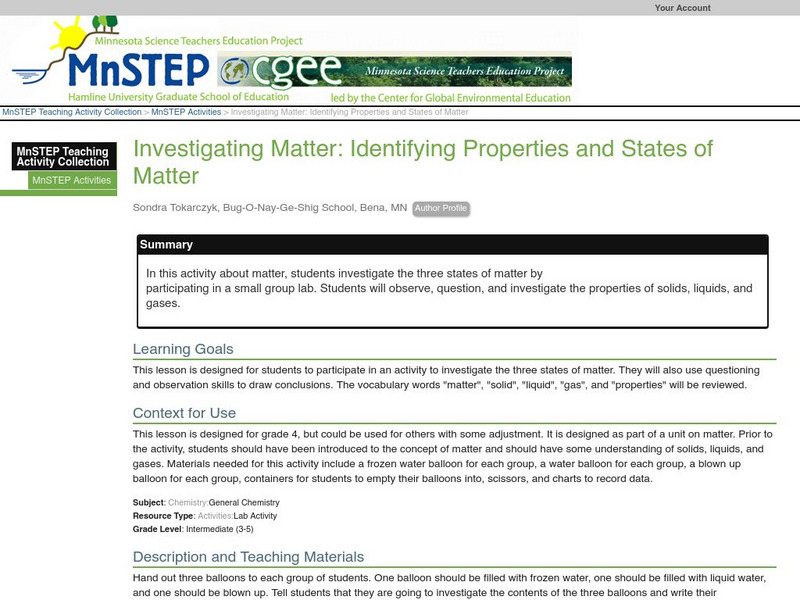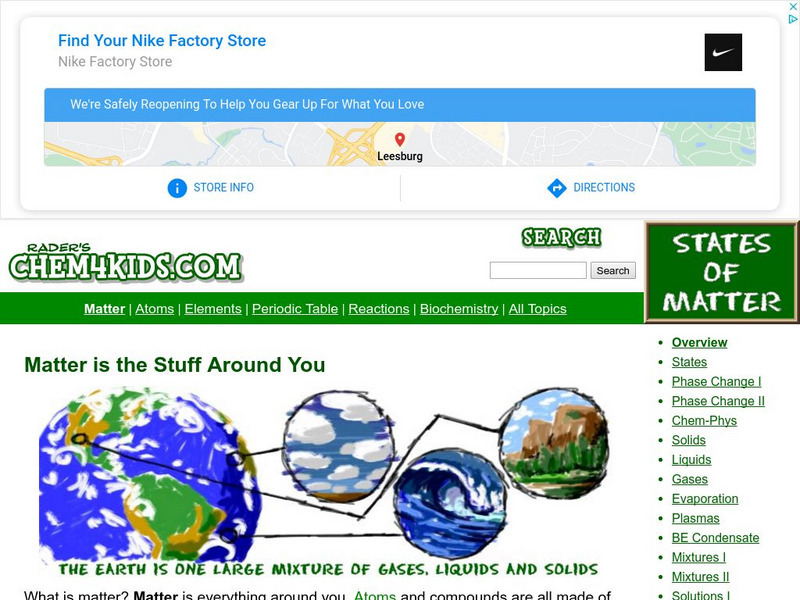Curated OER
Conservation of Mass
In this conservation of mass instructional activity, students experiment with vinegar, baking soda, a balloon and a flask. They compare the mass of the closed system of reactants before the experiment to the mass of the products after...
Curated OER
Disappearing Water
Students explore the water cycle. For this earth science lesson, students observe and measure water in a closed container and in an open container. Students record their observations and compare their sets of data to draw conclusions...
Curated OER
Molecules
Young scholars combine movement with science in this fun integrated lesson plan. When students are "liquid" they can "melt" or "ooze" at the end and when they are are "solids" they can "freeze" in a shape.
Curated OER
The Water Cycle
First graders investigate the different stages of the water cycle. They conduct Internet research and complete a water cycle WebQuest. Students identify what happens at each stage of the water cycle, and write about each stage in their...
Curated OER
Evaporation
Young scholars study the evaporation stage of the water cycle. In this water cycle activity, students participate in an experiment to study the process of evaporation that uses jars and water. Young scholars complete an observation...
Curated OER
Hot Gas Or Cold Gas Lab
Students engage in a lab project to study chemical reactions. They use guided questions to help facilitate the lab experience and come to the correct outcomes. The lesson does not contain a true understandable objective. The lesson could...
Curated OER
Super Glue Fuming of Latent Fingerprints
Students explore latent fingerprinting. They observe a supervised demonstration of the process that real-life crime scene investigators sometimes use to identify latent fingerprints. In addition, they brainstorm ways to improve the...
Curated OER
Vibrant Volcanoes
Students explore volcanoes. In this science instructional activity, students discuss the characteristics of volcanoes and view a video segment about a volcano. Students examine plate tectonics.
Curated OER
Separating Soup Mix
Students use screens of three sizes to separate a mixture of five solid materials. They plan and conduct simple investigations using appropriate tools, measures, and safety rules and record and report observations, explanations, and...
Curated OER
Solids and Water
Young scholars investigate mixtures made of water and familiar solid materials. They observe and discuss the changes that occur immediately and set the mixtures aside for a day. Finally, students observe the mixtures, note changes, and...
Curated OER
Periodic Table
Learners identify the periodic table trends and predict material properties. They also design and conduct simple experiments and test material properties. Finally, students compare and contrast material properties and that chemical...
Curated OER
Carbon Adventures Game
Sixth graders examine the processes and transformations that occur in carbon pools. They play a game to identify paths taken by carbon through the environment.
Curated OER
Diesel Bus Case Study
Learners research the diesel retrofit program underway in Norwich, Connecticut and identify the health risks of diesel fumes - in particular the emissions of fumes from school buses. They outline ways of reducing diesel emissions.
Curated OER
Water 2: Disappearing Water
Students will observe the amount of water in an open container over time and also examine the amount of water in a closed container over time. They then will compare and contrast the sets.
Curated OER
Coal and the Environment
Students read about how burning coal affects the environment. After students finish reading about how burning coal affects the environment they have a group discussion to discuss what they thought about the information.
Concord Consortium
Concord Consortium: Stem Resources: States of Matter
Using simulations observe what solids, liquids, and gases look like at the atomic scale. After observing the different states of matter at their atomic level, students will be able to conclude about the forces and attractions that exist...
Science Education Resource Center at Carleton College
Serc: Exploring States of Matter Gases
In this series of chemistry labs, students learn about the three states of matter by observing how molecules contract or expand as they change state.
Vision Learning
Vision Learning: States of Matter
Did you know the ancient Greeks first identified the three states of matter? Read about how the molecules differ in solids, liquids, gases, and plasma. View photographs and watch how the molecules move in each state. If you're really...
CK-12 Foundation
Ck 12: Chemistry: States of Matter
[Free Registration/Login may be required to access all resource tools.] Definition of state of matter and the three common states of matter and their differences.
CK-12 Foundation
Ck 12: Concepts, Classification and States of Matter
[Free Registration/Login may be required to access all resource tools.] Freshly baked bread and cherry pie are two delicious parts of any meal. What happens to the ingredients that go into the bread and the pie as they are heated in the...
ABCya
Ab Cya: States of Matter
States of Matter is an educational activity for kids to learn about the different properties of matter. The lesson will introduce solids, liquids, and gases. Students will then be assessed through a sorting activity where they will...
Science Education Resource Center at Carleton College
Serc: Investigating Matter: Identifying Properties and States of Matter
In this activity about matter, students investigate the three states of matter by participating in a small group lab. Students will observe, question, and investigate the properties of solids, liquids, and gases.
Chem4kids
Chem4 Kids: Matter
"Matter is everything." So begins this comprehensive website on the physical and chemical properties of matter in its four main states: solids, liquids, gases, and plasmas. The text is large and easy-to-read. Students will enjoy the...
American Chemical Society
American Chemical Society: Science for Kids: Solids, Liquids and Gases
Engaging hands on science lessons for grades 2-6 on the three states of matter.



